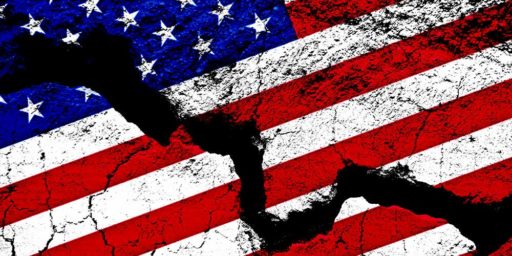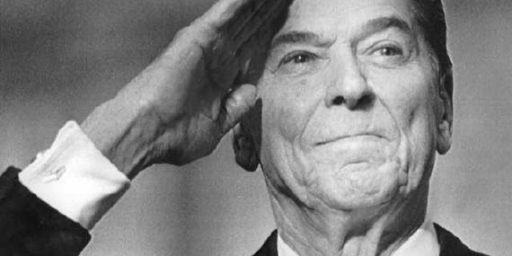CAN DEAN WIN: A ROUNDUP
As my previous post (and several others over the past couple of months) makes clear, I think Howard Dean will have a lot of trouble beating President Bush next year–although I don’t think it’ll be the blowout some predict. This topic seems to be on the minds of a lot of paid pundits today, as evidenced by the lineup at RealClear Politics.
Mort Kondracke thinks this will be “McGovern Versus Reagan.”
This looks to me like a deja vu presidential election, with the Democratic candidates all resembling their party’s past losers and President Bush setting himself up for a 1972- or 1984-style landslide.
***
The only hope Democrats now appear to have of beating Bush lies in Iraq’s turning into the “quagmire” they claim it is.
That would place Bush in the historical position of Lyndon Johnson in 1968 – though Bush won’t suffer Johnson’s fate (and Jimmy Carter’s in 1980) of being challenged for his own party’s nomination.
Democrats had hoped to see Bush retrace the steps of his father, who won the first Iraq war but got beat in 1992 amid a weak economy.
Hating Bush, Democrats also want to make him out to be another Richard Nixon.
From the beginning, though, Bush has plotted to be Ronald Reagan, stimulating the economy with defense spending and tax cuts, running up big deficits and causing the economy to boom. The latest growth numbers indicate that the plan is working.
Moreover, people like Bush the way they did Reagan. History is repeating itself.
Bill Kristol thinks Dean can win if he plays his cards right.
Going into the final day of the college football regular season, Oklahoma was undefeated and ranked No. 1. The Sooners had the best defense in the nation, had outscored their opponents by an average of 35 points and had a nine-game winning streak against ranked teams. “OU: Among best ever?” USA Today asked (rhetorically) on Friday. Kansas State, by contrast, had three losses, and had never won a Big 12 championship. Oklahoma was favored by two touchdowns. Kansas State, of course, won, 35-7.
For the next 11 months, Republicans, conservatives and Bush campaign operatives should, on arising, immediately following their morning prayers, repeat that score aloud 10 times. Underdogs do sometimes win. Howard Dean could beat President Bush. Saying you’re not overconfident (as the OU players repeatedly did) is no substitute for really not being overconfident. And if Bush loses next November, it’s over. There’s no BCS computer to give him another shot at the national championship in the Sugar Bowl.
Could Dean really win? Unfortunately, yes. The Democratic presidential candidate has, alas, won the popular presidential vote three times in a row — twice, admittedly, under the guidance of the skilled Bill Clinton, but most recently with the hapless Al Gore at the helm. And demographic trends (particularly the growth in Hispanic voters) tend to favor the Democrats going into 2004.
***
But is Dean a credible alternative? Was Kansas State? Dean has run a terrific primary campaign, the most impressive since Carter in 1976. It’s true that, unlike Carter (and Clinton), Dean is a Northeastern liberal. But he’s no Dukakis. Does anyone expect Dean to be a patsy for a Bush assault, as the Massachusetts governor was?
***
But what about Sept. 11? Surely Bush’s response to the attacks, and his overall leadership in the war on terrorism, remain compelling reasons to keep him in office. They do for me. But while Bush is committed to victory in that war, his secretary of state seems committed to diplomatic compromise, and his secretary of defense to an odd kind of muscle-flexing-disengagement. And when Bush’s chief of staff, Andrew H. Card Jr., said on Sunday with regard to Iraq, “We’re going to get out of there as quickly as we can, but not before we finish the mission at hand,” one wonders: Wouldn’t Howard Dean agree with that formulation? Indeed, doesn’t the first half of that sentence suggest that even the most senior of Bush’s subordinates haven’t really internalized the president’s view of the fundamental character of this war? If they haven’t, will the American people grasp the need for Bush’s continued leadership on Nov. 2? If not, prepare for President Dean.
David Brooks sees Dean’s flip-flopping as a plus:
My moment of illumination about Howard Dean came one day in Iowa when I saw him lean into a crowd and begin a sentence with, “Us rural people. . . .”
Dean grew up on Park Avenue and in East Hampton. If he’s a rural person, I’m the Queen of Sheba. Yet he said it with conviction. He said it uninhibited by any fear that someone might laugh at or contradict him.
It was then that I saw how Dean had liberated himself from his past, liberated himself from his record and liberated himself from the restraints that bind conventional politicians. He has freed himself to say anything, to be anybody.
Other candidates run on their biographies or their records. They keep policy staff from their former lives, and they try to keep their policy positions reasonably consistent.
But Dean runs less on biography than any other candidate in recent years. When he began running for president, he left his past behind, along with the encumbrances that go with it. As governor of Vermont, he was a centrist Democrat. But the new Dean who appeared on the campaign trail – a jarring sight for the Vermonters who knew his previous self – is an angry maverick.
***
He is, in short, a man unrooted. This gives him an amazing freshness and an exhilarating freedom.
Everybody talks about how the Internet has been key to his fund-raising and organization. Nobody talks about how it has shaped his persona. On the Internet, the long term doesn’t matter, as long as you are blunt and forceful at that moment. On the Internet, a new persona is just a click away. On the Internet, everyone is loosely tethered, careless and free. Dean is the Internet man, a string of exhilarating moments and daring accusations.
The only problem is that us rural folk distrust people who reinvent themselves. Many of us rural folk are nervous about putting the power of the presidency in the hands of a man who could be anyone.
Indeed, Al Gore found that out in 2000. But Dean seems better at reinvention than Gore, who always seemed uncomfortable.





